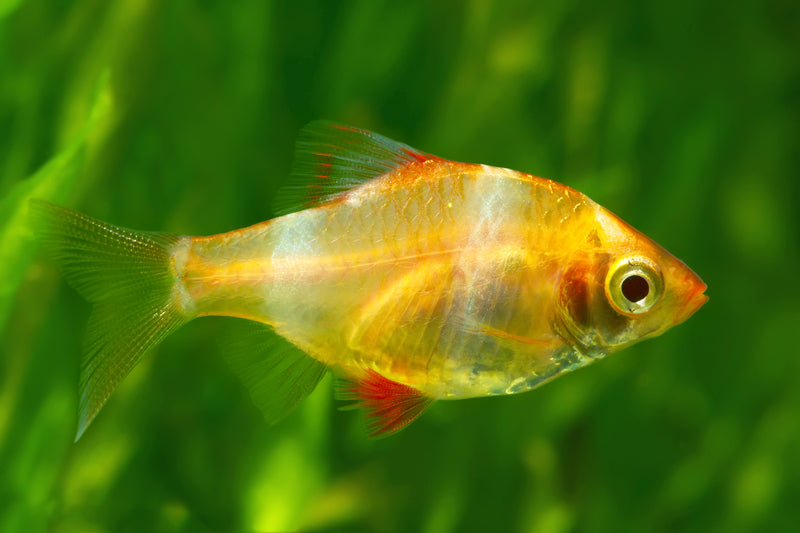You will not be allowed to compare more than 4 products at a time
View compareVendor
Angel Exotix AquariumTIGER ALBINO BARB vibrant color
TIGER ALBINO BARB vibrant color
SKU
TIGER ALBINO BARBProduct Type
Out of stock
Estimated delivery: 2-3 Days from order date.
Free Shipping & Returns: On orders above €70
- Free Delivery & Free Shipping
- Secure Online Payment
Couldn't load pickup availability
More payment Option

Description
Additional Information
Fish Care
Reviews
Description
The TIGER ALBINO BARB is a color morph of the classic Tiger Barb. It is a very attractive species for the nano and planted community aquarium!
The Albino Tiger Barb (Puntigrus tetrazona) is a semi-aggressive schooling species that is an excellent fish for the nano or planted aquarium.TIGER ALBINO BARB It is a notorious "fin-nipper", so it is best kept with quicker moving fish. It is known for its attractive striping and active behavior. It is rather exceptional in appearance, but not as common as the typical Tiger Barb. This particular species is native to Southern Sumatra, but is readily bred in the captivity. When kept in larger groups, males will display their best coloration while competing to attract females.
The Albino Tiger Barb typically occupies the top and middle level of the water column, although it can often be seen swimming and feeding in the middle and bottom levels as well. It is safe with other fast moving fish such as danios, minnows, and tetras. Larger, slower moving fish with long fins such as Angelfish may be harassed. It may prey on smaller dwarf shrimp and their fry. Larger, peaceful invertebrates can make good tankmates. The Albino Tiger Barb is best kept in groups of 6 or more, although larger groups are more ideal so that subdominant specimens are not bullied by dominant individuals during breeding behavior. It requires clean water to thrive and it will display optimal coloration and health in a planted aquarium with dark substrate.
Additional Information
The Albino Tiger Barb (Puntigrus tetrazona) represents an alluring variation within the Cyprinidae family, achieving prominence in the aquarium community through deliberate selective breeding efforts. This particular albino morph maintains the full spectrum of behavioural and physiological traits inherent to its progenitor, the conventional Tiger Barb. It is uniquely identified by its distinctive pinky-orange hue, red-tipped fins, and the replacement of traditional black stripes with white markings, a hallmark of its albino condition. The Albino Tiger Barb is celebrated for its lively and energetic nature, flourishing in aquarium settings that closely replicate its original habitats. Puntigrus tetrazona, a focal point of interest among aquarium enthusiasts, is valued not only for its visual attractiveness but also for its contribution to enhancing knowledge of aquatic biodiversity and the intricacies of ecosystem interactions.
Keeping Albino Tiger Barbs in groups of 8 to 10 individuals is recommended to ensure a harmonious aquarium environment. Large groups encourage interaction among the Tiger Barbs themselves, reducing the chance of aggression towards other species. Careful selection of tank mates is essential for peaceful coexistence with Tiger Barbs. Fish with delicate fins are less ideal due to Albino Tiger Barbs' fin-nipping tendencies. At the same time, fast-moving species like Danios, Platys, and most Catfish are considered compatible due to their similar activity levels. The Clown Loach is particularly well-suited as it not only lives peacefully with Albino Tiger Barbs but also mimics their schooling behaviour.
Albino Tiger Barbs are playful and active, requiring an environment that caters to their needs for optimal health. Soft, slightly acidic water conditions are preferable, though they are adaptable to various settings. A spacious area for swimming, enriched with live or artificial vegetation, proper lighting, and a fine substrate, is key to providing a stimulating and healthy habitat for these dynamic fish.
While not a picky eater, the Albino Tiger Barb will thrive and remain very colorful on a varied diet of omnivorous foods. High-quality flake food, pellets, and live, frozen, or freeze-dried Artemia, microworms, Tubifex, and finely chopped bloodworms will all be readily accepted.
Natural Habitat
Although Albino Tiger Barbs are a product of selective breeding and are not found in natural settings, their progenitors, the Tiger Barbs, possess a rich ecological background, with origins traced back to the verdant forests of Malaysia, Borneo, Thailand, Cambodia, and Sumatra. These fish have achieved international distribution, establishing populations in countries such as Australia, Singapore, Colombia, and the United States, a testament to their widespread popularity among aquarists globally.
In their indigenous habitats, Tiger Barbs flourish in serene water bodies characterized by rocky and sandy substrates, copious aquatic vegetation, and rivers shaded by dense foliage. Their diet is varied, encompassing algae, insects, invertebrates, and plant detritus, with a preference for pristine, well-oxygenated waters that contribute to the visual allure of their environments. Replicating such habitats for Albino Tiger Barbs in captivity demands a certain level of commitment but yields a dynamic and visually stimulating aquatic environment, rewarding the enthusiast's dedication.
Breeding
Successful Albino Tiger Barb breeding requires a dedicated aquarium for spawning and early development of the fry. This breeding tank should include fine-leaved plants and be filled with soft, slightly acidic water at a temperature somewhat higher than usual to stimulate spawning.
The tank's bottom should be bare or covered with a spawning substrate like mesh, marbles, or pebbles to prevent the adult fish from eating the eggs, thus enhancing the fry's survival rate.
For breeding, select six vibrant and healthy Albino Tiger Barbs, introduce them to the breeding tank, and monitor them until pairs form. Remove any unpaired fish and feed the pairs a diet of live foods to condition them for spawning. Spawning typically occurs in the early morning, with the female laying up to 200 eggs, which are immediately fertilized by the male. After fertilization, promptly remove the adult fish to protect the eggs. The eggs will hatch within 36 hours; after 4-5 days, the fry begins to swim freely. Feed the fry newly hatched brine shrimp, transitioning to finely ground flake food as they grow, to ensure their healthy development.
Diet & Feeding
Maintaining the health and vigour of Albino Tiger Barbs necessitates a well-rounded and nutritious diet. Despite their adaptability in feeding habits, the foundation of their diet should be high-quality flake food to bolster their immune system. For nutritional completeness, it's recommended to supplement their diet with a mix of frozen, live, and freeze-dried foods, such as Bloodworms, Daphnia, and brine shrimp, which Tiger Barbs readily consume. These fish also prefer small aquatic invertebrates and lightly steamed vegetables. Providing a diverse array of food ensures that Tiger Barbs receive all the necessary nutrients, supporting their health and enhancing their vibrant appearance in the aquarium.
Fish Care
Water Parameters
Water Type: Freshwater
pH Range: 5.5 – 7.5
General Hardness (GH): 5 – 19
Temperature Range: 20 – 26 °C (68 – 79 °F)
Approx Max Size: 8 cm
Temperament : Semi-Agressive
Aquarium Level : Middle
Difficulty: Beginner - Intermediate
Shoaling : Yes
Best Kept As : Groups 6+
Diet & Feeding : Omnivore
Reproduction : Egg-Scatterer
Average Lifespan : Up to 5 Years
Diet & FeedingAlbino Tiger Barbs are omnivores and not particularly picky.
Provide a diversified diet:
Live or frozen foods like bloodworms, daphnia, brine shrimp
• Plant-based foods such as lettuce or zucchini (for foraging behaviour)
• Occasional dry foods — flakes, pellets, granulesA varied diet helps cover all nutritional needs and supports good health and growth.
FAQ's
Reviews
You may also like
ALBINO GOLD AROWANA The rare Albino Gold Arowana
ALBINO BANJARED AROWANA
ULTRA BLUE BASE GOLDEN AROWANA - PREMIUM
SUPER RED AROWANA FRESHWATER FISH
24K GOLDEN AROWANA MALAYSIAN FISH SCALE
BLUE BASE GOLDEN AROWANA - Elegant Freshwater Fish
- Choosing a selection results in a full page refresh.







